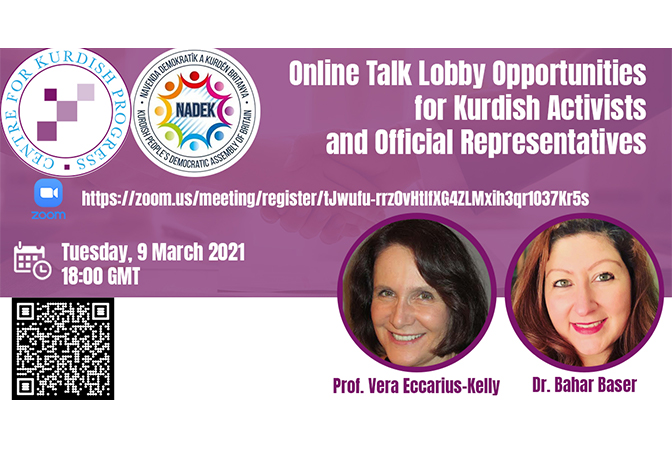Tuesday, 9 March 2021
at 6pm GMT
Over the past decade, the Kurdistan Region of Iraq (KRI) has made efforts to influence decision-makers in the US and represent Kurdish interests directly in Washington, DC. Vera Eccarius-Kelly, Professor of Political Science and International Relations at Siena College in Albany, New York, focused on the experience of the Kurdistan lobby in the US. The talk was chaired by Bahar Baser, Associate Professor, Centre for Trust, Peace and Social Relations, Coventry University. Baser began by emphasising the importance of the Centre for Kurdish Progress’s work and then introduced the speaker.
Eccarius-Kelly began by expressing her gratitude for the invitation and mentioned she was delighted to be participating in the event. She then provided a brief outline of what she will cover and emphasised that she will be offering some general remarks about Kurdish lobbying and activism in the US. She started by distinguishing lobbying from transnational activism and emphasised that we need to be aware of the difference between the two to be successful. She said top-down formal lobbying is sponsored by a state or sub-state and targeted corporate and state actors. Bottom-up activism by diaspora and immigrant groups is community-level organising by various diaspora networks.
She mentioned lobbying was a high-stake game and activism was a low stake-game. High stake official lobbying targets a particular policy, whereas lower-stake activism works towards improvement in the longer term and is not directly linked to a specific policy. Lobbying is outsourced to professionals, such as lawyers and consultants, whereas activism at the grassroots levels depends on personal connections. Lobbying is about money, and there are legal restrictions and registrations required. In contrast, activism does not require a lot of money but depends on the activists’ talents and dedications.
Eccarius-Kelly then moved on to discuss the lessons learnt from the Kurdish case in the US. Mentioned that the US was not so keen on the Kurds and the problems that they face. It is only interested when particular individuals and parties share their interest. She criticised the military and fossil fuel focused lobbying efforts and said that it is unlikely to create much impact. She also mentioned a hostility towards ‘ethnic lobbies’ in the US, which are also called ‘the foreign lobby’ because powerful foreign actors that are interested in changing the US foreign policy raise concerns.
Then Eccarius-Kelly moved on discussing the formal lobbying and the challenges it faces. The Kurdish lobbying efforts are hampered by internal divisions and are relatively small. More financial resources needed as a lot of money is required to be spent on highly skilled workers. The Kurdistan Regional Government (KRG) usually underspends, but this is not a surprise, and the question that should be raised is, should they spend on lobbying at all? The reason for this question is, if there is not an overlap between the US policy and the Kurdish interests, then lobbying efforts are likely not to succeed. Eccarius-Kelly also mentioned that the Kurdish lobby has enormous enemies that make it difficult for it to impact. She gave the recent article published in the New York Times about the Turkish invasion of Afrin and how it created security and opportunity for the Arab Syrian. It completely ignored what happened to the Kurdish residents of Afrin and painted a completely different picture than what had happened.
Eccarius-Kelly emphasised the importance of diaspora activism and transnational activism and mentioned the Kurdish community in Toronto as an example of such activisms making a significant impact through the social media awareness-raising campaigns, which shows transnational activism can gain traction. She argued that media outlets are essential and then referred to the legal action taken against the Turkish state in the US. The case relates to the Kurdish protestors being ‘violently attacked’ by Turkish President Erdogan’s bodyguards. A Kurdish businessman in Albany put money into supporting the court case (Kasim Kurd et al. v. The Republic of Turkey), and this case could have some impact.
Eccarius-Kelly offered some reflections on the US and said that there is a need to educate the public on the Kurds’ demands. She said the public intellectuals and academics are not integrated enough into the community’s efforts to raise awareness. She said there was a need for coalition-building in the US and mentioned students are very interested in the Kurdish issues and can be potentially targeted. She also mentioned the need to ‘push back harder against the Turkish securitisation language’. There was also a need for Kurdish issues to be covered by international human rights organisations.
Eccarius-Kelly argued that the Biden administration is potentially more friendly, but it is unlikely to do so much. Some of the pieces in the Middle East might move, but Eccarius-Kelly is not very optimistic that the Biden administration will very actively pursue policies to address the Kurdish demands. Concerning suggestions, Eccarius-Kelly mentioned the need to move the focus away from Washington, DC, to other areas where there is a Kurdish diaspora community. She said the US Secretary of State Antony Blinken has a position on the Kurdish question, which can help. She mentioned the Christian groups in the US and how they can be targeted and emphasised the Kurdistan lobby’s need to weave into their narrative the protection of the Chaldean Christians in the KRI.
Baser posed a question from the audience about the need to unify the Kurdish lobby and for Kurds to work together. Eccarius-Kelly argued that the Kurdistan lobby is unlikely to share its power as powerful interests and individuals drive it. She emphasised the weaknesses created by the lobbying groups not working together with the wider Kurdish community.
Baser posed a question about the increasing role of social media and how it has been used to raise awareness of the Kurds but asked whether social media activism can change ordinary people’s lives in Kurdistan. She wondered if it was social media activism or slacktivism? Eccarius-Kelly mentioned that sending a tweet does not make any impact. If people in the homeland are connected to them, they can put them in danger because Turkish intelligence officers monitor social media.
The event continued with further questions from the audience on several issues that Eccarius-Kelly’s talk raised.
Speakers’ biographies

Vera Eccarius-Kelly is professor of Political Science & International Relations at Siena College in Albany, New York, where she also contributes as the Academic Community Engagement Scholar-in-Residence by creating collaborations with immigrant and refugee organizations. Her research focuses on Kurdish diaspora mobilization, lobbying, and cultural expressions of ethno-nationalism. Among her more recent publications are “Kurdish Lobbying and Political Activism in the United States,” in a collection she co-edited on Kurdish Autonomy and U.S. Foreign Policy (Peter Lang, 2020) and a contribution titled “‘Do I Even Exist?’ Kurdish Diaspora Artists Reflect on Imaginary Exhibits in a Kurdistan Museum” in the Art of Minorities (Edinburgh Press, 2020). Eccarius-Kelly serves as an expert witness for asylum cases in NY immigration court and she is also a regular political contributor on WAMC radio, a regional affiliate of National Public Radio (NPR).

Dr. Bahar Baser is an Associate Professor at the Centre for Trust, Peace and Social Relations. She is also an associate research fellow at the Security Institute for Governance and Leadership in Africa (SIGLA), Stellenbosch University, South Africa. She is an expert in diaspora studies, peacebuilding, and conflict transformation. She has published extensively on stateless diaspora activism and mobilisation in Europe with a specific focus on host states’ counterterrorism policies, radicalization of diaspora members and transnationalization of homeland conflicts. Her book “Diasporas and Homeland Conflicts: A Comparative Perspective” was published by Routledge in 2015. She is currently working on her second book on diasporic returns to the Kurdistan Region of Iraq.

